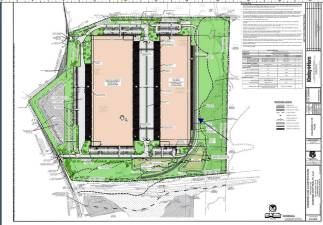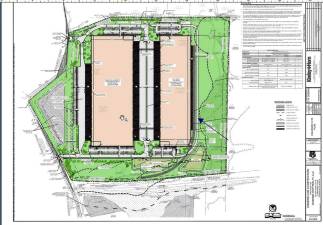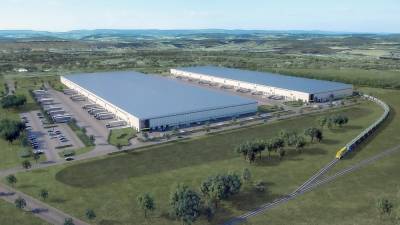Overflow crowd determined to make its views known on massive Sparta warehouse
Sparta. The second hearing mainly tackled limited and unanswered questions from the first hearing. Local lawyers tried to stop it, saying the project is likely a conditional use, and that the planning board has no jurisdiction over it. The developer’s lawyer said the project would be automatically approved if a hearing didn’t happen within 95 days.

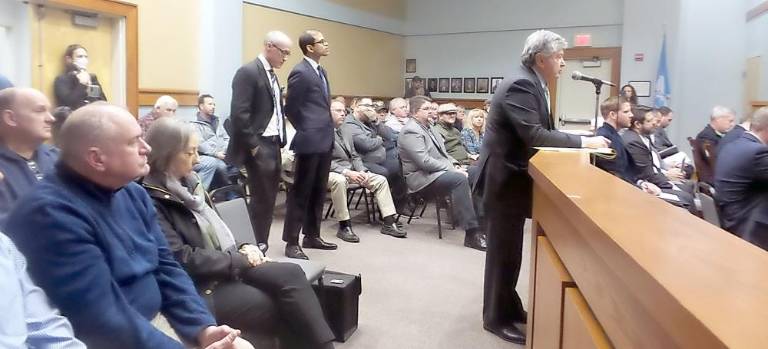
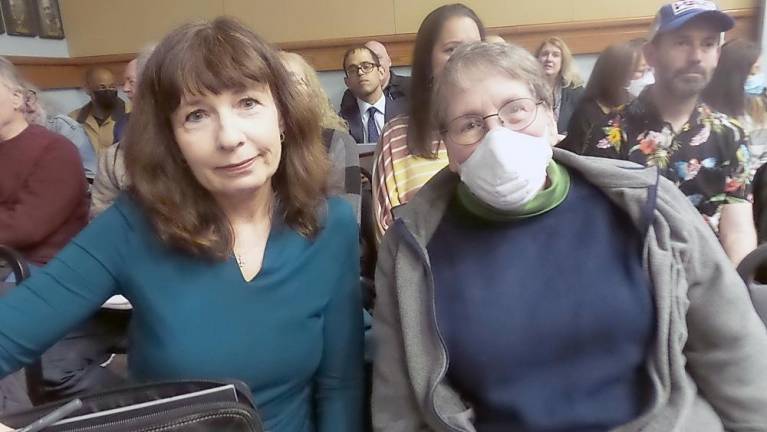
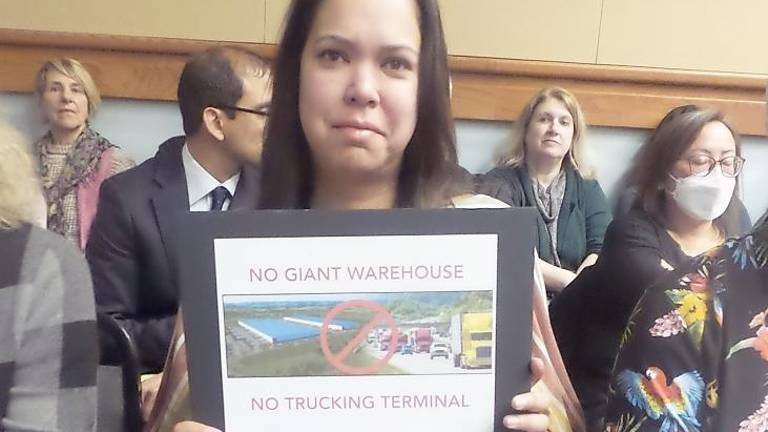
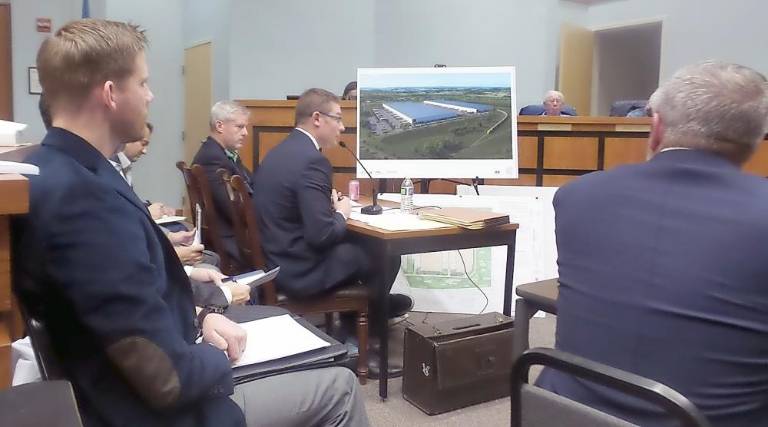
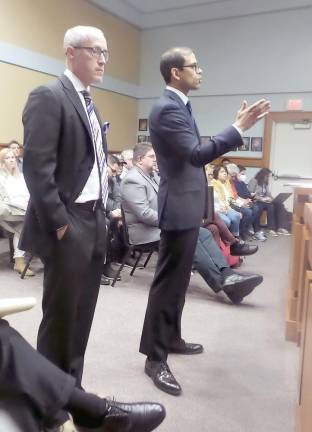
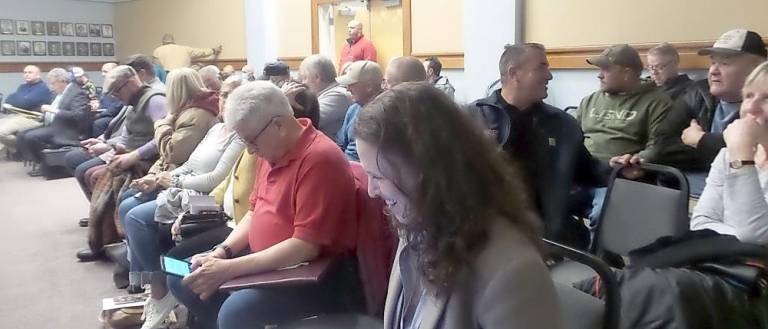
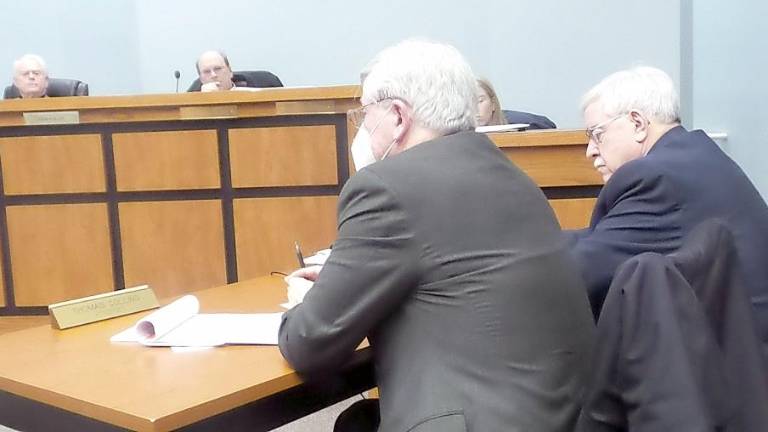

The overflow crowd was limited in the questions it could ask when Sparta Township held its second public hearing on the 880,000-square-foot Diamond Chip Realty warehouse proposed for Demarest Road.
In fact, Steve Gouin, attorney for the developer, tackled 72 questions posed by members of the public at the first public hearing in March. That hearing, which was held on Zoom, was heavily criticized because the public was unable to participate.
Andrew Reina, the planning board chair, said the time for audience questions during that night’s hearing would begin at 9 p.m., two hours after it started.
Reina said the board would listen only to specific questions about how the project would affect traffic and the environment. The hearing is a “judicially based process” that did not allow statements, and especially not opinions, he said.
But members of the public were determined to make known their objections to the massive industrial project was wrong for their communities. As Gouin addressed the public’s questions, audience members made fun of his answers. They called out their responses, like: “Yeah, right,” and “How can you say traffic won’t be affected? You don’t live here.”
Sparta resident Mya Wydenback held a poster stating: “NO GIANT WAREHOUSE. NO TRUCKING TERMINAL.”
Is it a trucking terminal?
Lawyers Anand Dash and Neill Clark, who live and own property in Sparta, are working pro bono to challenge the project. Before the hearing even started, they urged the planning board to cancel the hearing altogether.
They said if the Zoning Board of Adjustment decides the application is for a trucking terminal, the planning board would no longer have jurisdiction over it. That’s because trucking terminals are conditional uses in Sparta, which means that approval is contingent on the applicants meeting a number of conditions. The two proposed buildings would have a total of 191 docks and 50 spaces for tractor-trailers (see sidebar).
“If the Planning Board proceeds in this matter without a decision from the Zoning Board of Adjustment, such a decision would be (a) plain and reversible error...and would afford Objectors a direct right to appeal,” the lawyers wrote in an April 4 letter to the planning board. It sums up: “In the interests of time, cost, and efficiency for all parties involved, the Site Plan Application must be stayed” under the jurisdictional issue is resolved.
Dash said there was a difference between passion and politics that required respect for the law.
Lawrence Cohen, an attorney representing local clients Michael and Georgina Burns, agreed that the board of adjustment needed to determine whether the project is a truck terminal.
‘Sparta is not a city’
Members of the public already squeezed out of the meeting hall 15 minutes before the hearing was set to start. The massive project has galvanized not only the Sparta community but residents in towns, like Lafayette and Andover, who live in areas bordering the site and are concerned about a significant uptick in the heavy truck traffic. Ten minutes before the hearing was set to start, no open seats remained.
At each end of the vestibule was a TV, with some chairs where people could sit to watch the hearing. Others stood in the crowded space between the two TVs, listening quietly. A dozen more stood outside, on the steps leading into Sparta Municipal Hall.
Tom Collins, attorney for the planning board, and Gouin, attorney for the developer, said neither Dash nor Clark correctly understood the law. His advice to the board was to proceed with the hearing.
Gouin said the planning board hadn’t yet heard the entire application. He and Collins said Dash and Clark’s references amounted to an incorrect application of the law and were “not factually analogous at all.”
Collins said “black letter law” required that the board proceed, and that it had no authority to stay the hearing. If the hearing did not happen within the legal 95-day time limit, he said, the project will be approved automatically.
Reina then said the hearing would move forward. Dash said the board was disrespecting the process.
Local resident Vivian Perlmutter said in an email to the paper that “Mr. Ford constantly referred to Sparta as a ‘city.’”
She was referring to the testimony of James Ford, CEO of TRES III, LLC, of Bradenton, Fla., who argued in favor of the project, and the tax revenue it will bring to Sussex County. According to Ford’s Linked In page, TRES III has its “focus in supply chain savings from a shipper/carrier perspective. We develop in strategic, national locations that drive overall savings. Real estate decisions are just one aspect of the approach to client efficiency.”
“We who live here want to live in a rural community,” Perlmutter said. “We want the government to work on our current traffic problems. We don’t want added truck traffic and the noise that goes with an operation like this giant warehouse. When residents told the planning board that we have traffic problems currently, the board member replied that we needed to tell the police because they could do nothing to help us. They could help us by not allowing this warehouse here. These trucks will harm the entire region. Our roads are country roads, not highways.”
“When residents told the planning board that we have traffic problems currently, the board member replied that we needed to tell the police because they could do nothing to help us. They could help us by not allowing this warehouse here. These trucks will harm the entire region. Our roads are country roads, not highways.” Vivian Perlmutter
